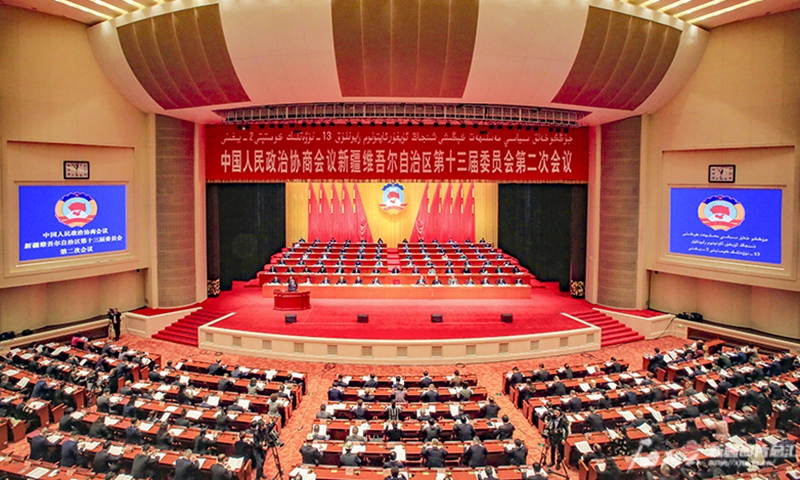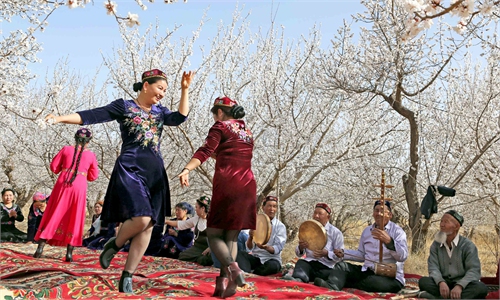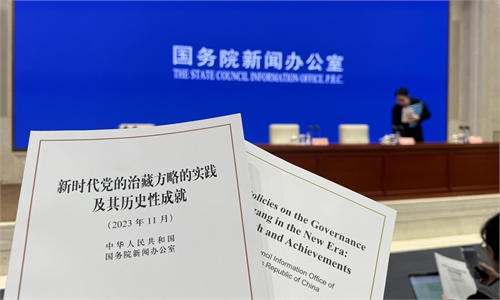Xinjiang regional ‘two sessions’ kick off
International representatives, foreign media invited to meetings, showcasing openness, confidence

The Second Session of the 13th Xinjiang Uygur Autonomous Region Committee of the CPPCC kicked off on January 29, 2024 in Urumqi. Photo: ts.cn
Northwest China's Xinjiang Uygur Autonomous region has entered the local "two sessions"period as the regional committee of the Chinese People's Political Consultative Conference (CPPCC) opened on Monday. For the first time, international representatives and foreign media outlets were invited to sit in on or cover the "two sessions," showcasing the region's openness and confidence, analysts said.
The Second Session of the 13th Xinjiang Uygur Autonomous Region Committee of the CPPCC kicked off on Monday. Senior regional officials, including the regional Party chief Ma Xingrui, attended the meeting, local media outlet ts.cn reported.
The Second Session of the 14th People's Congress of the Xinjiang Uygur Autonomous Region is scheduled to be open on Tuesday.
The regional foreign affairs office has invited diplomats from the embassies of Shanghai Cooperation Organization (SCO) member states, SCO observer states and dialogue partners, as well as representatives of international organizations such as the SCO Secretariat and the Central Asian Regional Economic Cooperation Institute, to sit in on the meetings, according to a press conference held ahead of the regional "two sessions" on Sunday.
Dozens of domestic and international media outlets, including four foreign media organizations, as well as 10 from Hong Kong and Macao, attended the press conference on Sunday.
The local "two sessions" are the annual meetings of provincial-level lawmakers and political advisors, during which plans for local economic and social development in the year ahead are discussed. Analysts noted that inviting international friends to attend the local "two sessions" would not only improve the region's exchanges with related countries, but also expand cooperation and promote political trust.
Security and counter-terrorism are core cooperation for SCO members and previously, some high-level meetings of the SCO were held in Xinjiang. Inviting SCO members and observer countries to attend the local "two sessions" is to show the achievements of China's counter-terrorism as well regional cooperation, Wang Jiang, an expert at the Institute of China's Borderland Studies at Zhejiang Normal University, told the Global Times on Monday.
Moreover, following extended counter-terrorism efforts, Xinjiang is now experiencing accelerated development. The region will take more measures to encourage development and it is taking the initiative to let regional countries to know more about the future trend, said Wang.
With a unique geographic advantage, Xinjiang, which sits at China's westernmost frontier bordering eight countries including Mongolia, Russia, Kazakhstan, Kyrgyzstan, Tajikistan, Afghanistan, Pakistan and India, has become a frontier of opening-up and innovation as well as a significant gateway for China to open up to the Central Asia and an important node along the Belt and Road Initiative.
According to data from local customs authorities, in 2023, the import and export between Xinjiang and the five Central Asian countries, namely Kazakhstan, Kyrgyzstan, Tajikistan, Turkmenistan and Uzbekistan, increased by 50 percent year on year, accounting for 79.4 percent of Xinjiang's total foreign trade.
The region engaged in trade with 192 countries and regions worldwide last year. Its trade with Malaysia, South Africa, Qatar and Algeria also posted robust growth.
Inviting foreign diplomats, media and international representatives to attend the "two sessions" would also help the outside world get a better understanding of the region and how it is promoting high-quality development while fully guarantee human rights of all ethnic groups, analysts said.
According to the Sunday press conference, the regional committee of the CPPCC currently has 527 members, with 244 members from ethnic minority groups.
Some Western countries have continued to call for China to be more transparent over Xinjiang region. The fact is we have always been doing so, said Wang, noting that China has released several white papers on different fields of the region, including on counter-terrorism, protection of ethnic culture and human rights development; and also on inviting foreigners to come to visit Xinjiang.
Despite the rumors fabricated by some anti-China forces, the Xinjiang region has always been open to the outside world and has been continuing to move forward in its own pace, said Wang, noting that lies would not stop Xinjiang's development.
In 2023, Xinjiang received a total of 390 delegations from around the world, totaling more than 4,300 people, the largest scale in history, according to ts.cn.




